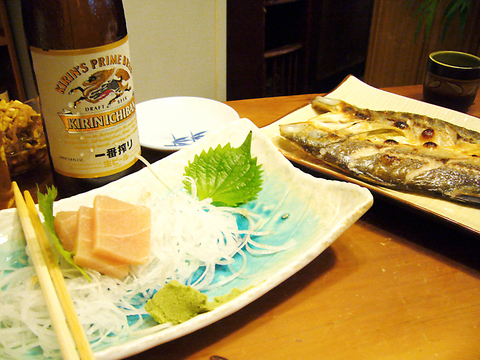Over the past couple of years Taipei has seen a marked rise in the number of fusion Japanese restaurants, where East
supposedly meets West and the interior design is "so" creative that it proves more of a conversation piece than the food itself.
If you're fed up with dining out at such places and are looking for something more down to earth, then Xiao Jiang

PHOTO: GAVIN PHIPPS, TAIPEI TIMES
(
At first glance the joint has all the trappings of a common Taiwanese beerhouse with its outdoor refrigerator and a
relaxed come-as-you-like attitude. Unlike its more earthy brethren, however, Xiao Jiang is both clean and inviting and you certainly won't find yourself seated next to a gang of lads spitting betel nut juice onto the floor.
There's no pretence at Xiao Jiang. There's no arty decor, the furniture is not "fashionably mod" and the wait staff are, thankfully, more concerned with the hunger pangs of the patrons rather their hairstyles. Diners are treated to traditional Japanese folk, or nakashi music, which plays constantly at a moderate volume.
There is no menu, so ordering is simply a case of peering into the large refrigerator and choosing your fare from the smorgasbord of fresh foodstuffs that lurk within. These include various types of fish, king prawns, mussels, clams, giant oysters, squid, chicken, beef, pork and just about any other edible creature.
The food is seasonal and as such prices do fluctuate somewhat depending on the availability of certain fish and vegetables. As such a meal for two -- sashimi, barbecued fish, a vegetable dish, giant grilled oysters and rice cake -- will at present set diners back roughly NT$1,500.
If you have no clue as to what you want to eat, or what some of the oceanic oddities are, let alone how you want them prepared, then the staff will be more than happy to introduce you to several of the house specials. While it's impossible to pick a winner, as all the food eaten by this reviewer at the joint has been superb, one of my recommendations is the BBQ Tilapia (吳郭魚). When it's smothered with freshly squeezed lemon juice it is by far one of the best fish dishes to be had in all of Taipei.
The joint has a mini bar and patrons can order pricey bottles of whiskey and other spirits, but in keeping with the Japanese flavor of the repast, the best brew on offer is Kirin beer.

On April 26, The Lancet published a letter from two doctors at Taichung-based China Medical University Hospital (CMUH) warning that “Taiwan’s Health Care System is on the Brink of Collapse.” The authors said that “Years of policy inaction and mismanagement of resources have led to the National Health Insurance system operating under unsustainable conditions.” The pushback was immediate. Errors in the paper were quickly identified and publicized, to discredit the authors (the hospital apologized). CNA reported that CMUH said the letter described Taiwan in 2021 as having 62 nurses per 10,000 people, when the correct number was 78 nurses per 10,000

As we live longer, our risk of cognitive impairment is increasing. How can we delay the onset of symptoms? Do we have to give up every indulgence or can small changes make a difference? We asked neurologists for tips on how to keep our brains healthy for life. TAKE CARE OF YOUR HEALTH “All of the sensible things that apply to bodily health apply to brain health,” says Suzanne O’Sullivan, a consultant in neurology at the National Hospital for Neurology and Neurosurgery in London, and the author of The Age of Diagnosis. “When you’re 20, you can get away with absolute

May 5 to May 11 What started out as friction between Taiwanese students at Taichung First High School and a Japanese head cook escalated dramatically over the first two weeks of May 1927. It began on April 30 when the cook’s wife knew that lotus starch used in that night’s dinner had rat feces in it, but failed to inform staff until the meal was already prepared. The students believed that her silence was intentional, and filed a complaint. The school’s Japanese administrators sided with the cook’s family, dismissing the students as troublemakers and clamping down on their freedoms — with

As Donald Trump’s executive order in March led to the shuttering of Voice of America (VOA) — the global broadcaster whose roots date back to the fight against Nazi propaganda — he quickly attracted support from figures not used to aligning themselves with any US administration. Trump had ordered the US Agency for Global Media, the federal agency that funds VOA and other groups promoting independent journalism overseas, to be “eliminated to the maximum extent consistent with applicable law.” The decision suddenly halted programming in 49 languages to more than 425 million people. In Moscow, Margarita Simonyan, the hardline editor-in-chief of the